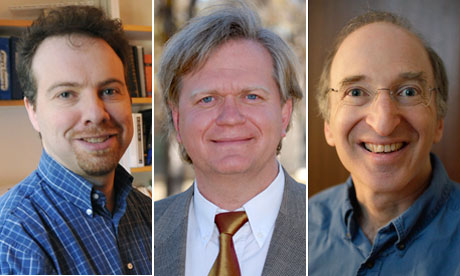
Saul Perlmutter(right)
Brian P. Schmidt(middle)
Adam G. Riess(left)
These Nobel prize for physics winners contribute for the accelerating expansion of the universe by observing a supernovae
The accelerating universe is the observation that the universe appears to be expanding at an increasing rate, which in formal terms means that the cosmic scale factor a(t) has a positive second derivative,[1] implying that the velocity at which a given galaxy is receding from us should be continually increasing over time[2] (here the recession velocity is the same one that appears in Hubble's law; defining 'velocity' in cosmology is somewhat subtle, see Comoving distance#Uses of the proper distance for a discussion). In 1998, observations of Type Ia supernovae suggested that the expansion of the universe has been accelerating[3][4] since around redshift of z~0.5.[5] The 2006 Shaw Prize in Astronomy and the 2011 Nobel Prize in Physics were both awarded to Saul Perlmutter, Brian P. Schmidt, and Adam G. Riess for the 1998 discovery of the accelerating expansion of the Universe through observations of distant supernovae.[6][7]
In cosmology, the notion of an Accelerating Expansion of the cosmos is that the matter of the observed universe that is expanding outward from the big-bang is also expanding at an accelerating velocity.

Walang komento:
Mag-post ng isang Komento